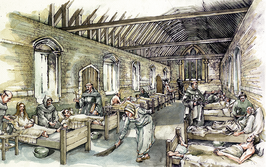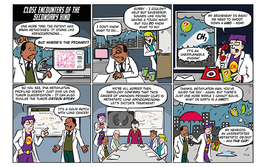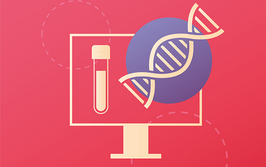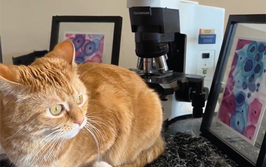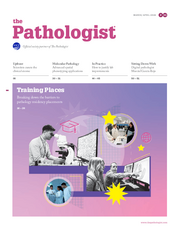
Bacterial Biomarker Hope for Infants
Changes in the gut microbiome of infants who develop necrotizing enterocolitis may allow us to predict, and perhaps even treat, the disease
Necrotizing enterocolitis (NEC) – the name alone conjures up unpleasant images of intestinal disease and tissue death. It’s worse still to realize that NEC affects approximately one in 10 premature infants, as well as many full-term babies with other health issues. “As a clinician, I am desperate to see new approaches toward prevention,” says Barbara Warner, first author on a new study that reveals a potential microbial biomarker for the disease (1). “NEC is now the most common cause of mortality among preterm infants who survive the immediate perinatal period.” Fortunately, Warner’s new study may offer a means of tackling NEC – a disease where waiting until onset means it’s already too late.
Warner and her colleagues at the National Institute of Allergy and Infectious Diseases examined stool samples from 46 premature infants who developed NEC and 120 age-, birthweight- and birthdate-matched infants who did not. Genetic sequencing and statistical analysis revealed that the NEC population had significantly higher proportions of Gammaproteobacteria in their gut microbiome, and lower proportions of Clostridia and Negativicutes. This discovery raises many more questions for the researchers. “We hypothesize that the potential driver(s) behind this microbial signature could be related to the microbial community itself, the host, or both,” Warner explains. “Is it that specific pioneering microbes set the stage for subsequent colonization patterns? What then would be the determinants of those pioneering microbes? Alternatively, could it be that the host response is a determinant of which microbial community evolves? Preterm infants have an immature immune system, and it is increasingly evident that the gut microbiome and host immune systems are in a close reciprocal relationship that may be impacted by that immaturity.”
We can’t be sure yet which came first – the chicken or the egg; the changes to gut microbiota or the disease. But as technology for microbial community profiling advances, we can certainly envision a use for these changes in the clinic. “A rapid turnaround test that screens this easily accessible analyte, stool, could be put into place. There are still challenges, however, including the longitudinal nature of the signature. Identification of infants at risk would require monitoring stool samples over time to follow the trajectory.” The researchers are now investigating whether or not there are specific signatures related to disease severity and the need for surgical intervention – but while that work is ongoing, Warner says, “For the first time we can begin to examine microbially informed approaches for disease prevention. This bacterial signature offers, at the very least, a biomarker for soon-to-develop NEC. Moreover, we now have a set of plausible drivers, and little else in our toolbox to reduce incidence and improve the outcome (30–40 percent fatality rate) of NEC.” The outlook for the disease has not changed meaningfully in four decades, but for pathologists who would like to see that change, Warner recommends, “Stay tuned to new methodology related to rapid microbial community profiles, rather than identification of any one specific organism as it relates to disease.”
- BB Warner et al., “Gut bacteria dysbiosis and necrotising enterocolitis in very low birthweight infants: a prospective case-control study”, Lancet, S0140-6736(16)00081-7 (2016). PMID: 26969089.

While obtaining degrees in biology from the University of Alberta and biochemistry from Penn State College of Medicine, I worked as a freelance science and medical writer. I was able to hone my skills in research, presentation and scientific writing by assembling grants and journal articles, speaking at international conferences, and consulting on topics ranging from medical education to comic book science. As much as I’ve enjoyed designing new bacteria and plausible superheroes, though, I’m more pleased than ever to be at Texere, using my writing and editing skills to create great content for a professional audience.


